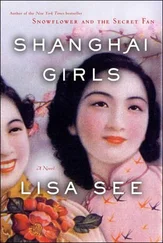Lisa See - Peony in Love
Здесь есть возможность читать онлайн «Lisa See - Peony in Love» весь текст электронной книги совершенно бесплатно (целиком полную версию без сокращений). В некоторых случаях можно слушать аудио, скачать через торрент в формате fb2 и присутствует краткое содержание. Жанр: Старинная литература, на английском языке. Описание произведения, (предисловие) а так же отзывы посетителей доступны на портале библиотеки ЛибКат.
- Название:Peony in Love
- Автор:
- Жанр:
- Год:неизвестен
- ISBN:нет данных
- Рейтинг книги:4 / 5. Голосов: 1
-
Избранное:Добавить в избранное
- Отзывы:
-
Ваша оценка:
- 80
- 1
- 2
- 3
- 4
- 5
Peony in Love: краткое содержание, описание и аннотация
Предлагаем к чтению аннотацию, описание, краткое содержание или предисловие (зависит от того, что написал сам автор книги «Peony in Love»). Если вы не нашли необходимую информацию о книге — напишите в комментариях, мы постараемся отыскать её.
Peony in Love — читать онлайн бесплатно полную книгу (весь текст) целиком
Ниже представлен текст книги, разбитый по страницам. Система сохранения места последней прочитанной страницы, позволяет с удобством читать онлайн бесплатно книгу «Peony in Love», без необходимости каждый раз заново искать на чём Вы остановились. Поставьте закладку, и сможете в любой момент перейти на страницу, на которой закончили чтение.
Интервал:
Закладка:
them sat together to embroider and make conversation. I did not allow sniping words to come out of either of their mouths. And Ren did not feel the need to call for the doctor.
I insisted Ze follow these rituals to appease her husband’s anxiety and earn her mother-in-law’s respect. When Ze cooked, she made sure that all the flavors were compatible and that the food was fragrant. She brought to the dinner table fish from West Lake and watched quietly to make sure the others enjoyed the taste. She poured tea when her mother-in-law’s or husband’s cup was low. Once these obligations were fulfilled, I drew her back to the bedchamber and we’d get back to work.
By now I’d learned a lot about married life and sexual love. It was not the sordid thing that Sister Stone joked about or that the Flower Spirit liked to make bawdy innuendo about in The Peony Pavilion. I now understood it to be about spiritual connection through physical touch. I made Ze write: Liniang says, “Ghosts can be careless about passion, but humans must affect propriety.” Liniang cannot and should not be considered ruined for having made clouds and rain with Mengmei in her dream. She could not become pregnant in a dream nor could she become pregnant as a ghost.
Clouds and rain in a dream is without consequence, demands no responsibility, and should bring no shame. All girls have dreams of this sort.
This does not soil them, far from it. A girl who dreams of clouds and rain is preparing herself for the fulfillment of qing . As Liniang says, “Betrothal makes a wife, elopement only a concubine.” Between a husband and wife, what some consider lascivious becomes elegant.
But qing couldn’t just be limited to husbands and wives. What about mother love? I still missed my mother and longed for her. Across the lake, she had to be missing me too. Wasn’t that qing also? I had Ze turn to the scene of Mother and Daughter Reunited, when Liniang—once again alive—meets her mother by accident in the Hangzhou guesthouse. Years ago, I’d considered this scene merely a respite from all the battles and political intrigue that riddled the last third of the opera. Now, when I read it, I was drawn into the world of qing —feminine, lyrical, and very emotional.
Madame Du and Spring Fragrance are horrified when Liniang emerges from the shadows, believing they’re seeing a ghost. Liniang weeps, while the other two women shrink back in fear and disgust. Sister Stone steps into the room with a lamp. Quickly assessing the situation, she takes Madame Du’s arm. Let the lamplight aid the moon to show your daughter’s fea-
( 1 7 4 )
tures. From the darkness of misunderstanding. Madame Du sees that the girl before her truly is her daughter and not just a ghost. She recalls the desperate sadness she felt at Liniang’s death; now she must overcome her fear of an otherworldly creature. That’s how deep her mother love is, but it was even more than that.
I held Ze’s hand as she wrote:
In believing that the creature before her is human, Madame Du not only acknowledges Liniang as human but also gives her back her place in the human world.
To me, this was the purest definition of mother love. For all the pain, for all the suffering, for all the disagreements between the generations, a mother gives the child her place in the world, as a daughter and as a future wife, mother, grandmother, aunt, and friend.
Ze and I wrote and wrote and wrote. By spring, after six obsessed months, I was finally worn out. I thought I’d written everything I could about love. I looked at my sister-wife. Her eyes were swollen with fatigue.
Her hair hung limp and stringy. Her skin had gone very pale from our work, the sleepless nights, and keeping her husband and mother-in-law happy. I had to acknowledge her role in my project. I gently blew at her.
She shivered and automatically picked up the brush.
On two blank pages at the front of the opera, I helped Ze compose an essay explaining how the commentary had come to be written, leaving out anything that would seem strange or improbable in the earthly realm.
There had once been a lovesick girl who loved The Peony Pavilion. This girl, Chen Tong, was betrothed to the poet Wu Ren, and at night she wrote her thoughts about love in the margins of the opera. After she died, Wu Ren married another girl. This second wife came upon the copy of the opera with her predecessor’s gentle words. She was compelled to finish what her sister-wife had started, but she didn’t have the second part of the opera. When her husband came home with a text of the entire opera, she got drunk with happiness. After that, whenever Wu Ren and Tan Ze passed time appreciating flowers, he teased her about the time she drank too much, fell asleep, and slept all one day and into the next. Tan Ze was diligent and thoughtful. She completed the commentary and decided to offer it to those who embrace the ideals of qing.
It was a simple explanation, pure and mostly true. Now all I needed was for Ren to read it.
( 1 7 5 )
.
.
.
i was s o accustomed to having Ze obey me that I didn’t pay attention when, after Ren left the house to meet friends at a lakeshore teahouse, she pulled out my original copy of Volume One. I didn’t give a moment’s thought when she took it outside. I believed she was going to reread my words and think about everything I’d taught her about love. I wasn’t even concerned when she crossed the zigzag bridge that led across the water to the summer pavilion in the middle of the Wu family’s pond. Under no circumstances could I navigate the sharp corners of the bridge. Still, I heard no alarms. I sat on a jardinière near the edge of the pond, under the plum tree that refused to leaf, bloom, or bear fruit, and prepared myself to enjoy the serenity of the scene. It was the fifth month in the eleventh year of Emperor Kangxi’s reign, and I thought how tranquil the late-spring day was, with Ze—a pretty if thin-lipped young wife—enjoying the lotus blooms on the pond’s placid surface.
But when she pulled out a candle from her sleeve and lit it outside in daylight, I jumped to my feet. I paced back and forth anxiously, and the air around me swirled in response. I watched in absolute horror as she tore a page out of Volume One and slowly and deliberately placed it in the flame. Ze smiled as the paper crinkled into blackness. When she could hold it no longer, she dropped the tiny shred that remained over the railing. The last of the paper trailed down, burning into nothing before hitting the water.
She tore out another three pages from the book. Again she set them on fire and dropped them over the edge of the pavilion. I tried to run to the bridge, but my bound feet were useless. I fell, scraping my chin and hands.
I scrambled back to my feet and hurried to the zigzag bridge. I stepped onto it, made my way to the first turn, and stopped cold. I couldn’t walk wide around this corner. Zigzag bridges were designed this way as a barrier to spirits like me.
“Stop!” I screamed. For a moment the whole world shivered. The carp stilled in the pond, the birds went quiet, and flowers lost their petals. But Ze didn’t even look up. She methodically tore out another few pages and burned them.
I ran, tripping, scrambling, flailing, back to the shore. I shouted across the pond, sending waves against the zigzag bridge and the pavilion, spinning the air in hopes of blowing out the candle. But Ze was wily. She took ( 1 7 6 )
the candle from the ledge and sank to her knees on the pavilion floor where she’d be sheltered from the breezes and gusts I sent her way. Once she was settled, a new even crueler idea seized her mind. She tore out all the pages from the book, crumpled them, and put them into a pile. She tipped the candle, and then hesitated for a moment, letting the wax drip down onto the wadded sheets. She glanced around, her eyes furtively scanning the shore and the surrounding halls to make sure no one was looking, and then she touched the flame to the paper.
Читать дальшеИнтервал:
Закладка:
Похожие книги на «Peony in Love»
Представляем Вашему вниманию похожие книги на «Peony in Love» списком для выбора. Мы отобрали схожую по названию и смыслу литературу в надежде предоставить читателям больше вариантов отыскать новые, интересные, ещё непрочитанные произведения.
Обсуждение, отзывы о книге «Peony in Love» и просто собственные мнения читателей. Оставьте ваши комментарии, напишите, что Вы думаете о произведении, его смысле или главных героях. Укажите что конкретно понравилось, а что нет, и почему Вы так считаете.












